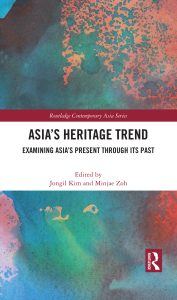
Contents
Part One. Examining Asia’s in the contemporary world: Key notions
1. Introduction – Jongil Kim(Seoul Nat’l Univ.) , Minjae Zoh(Asia Center at Seoul Nat’l Univ.)
2. Asia’s heritage trend: Underpining the existing components and perspectives – Minjae Zoh(Asia Center at Seoul Nat’l Univ.)
3. Heritage value in comparative perspective – John Carman(Ironbridge International Institute for Cultural heritage at Univ. of Birmingham)
4. An Observation of Asia’s sites on the UNESCO World Heritage List through data-analysis of Criteria for Selection – Ilhong Ko, Minjae Zoh(Asia Center at Seoul Nat’l Univ.), Junyoung Park(Seoul Nat’l Univ.)
Part Two. Critical and specific issues in Asia’s heritage management
5. Silk Road narratives in East Asia: Cultural heritage, cultural propaganda and cultural erasure – Susan Whitfield(Univ. of East Anglia)
6. Acheology, politics and diplomacy in Afghanistan: The international years(1946-1978) – J. Eva Meharry(Association for Diplomatic Studies and Training, Washington, D.C.)
7. Asia’s difficult heritage-making between nationalism and transnationalism: Colonial prisons in South Korea, Taiwan and China – Hyunkyung Lee(Critical Global Studies Institute at Sogang Univ.) , Shu-mei Huang(Graduate Institute of Building and Planning at Nat’l Taiwan Univ.)
8. Political uses of sacred heritage at the Shwedagon Pagoda in British Burma(1824-1948) – Alicia Stevens(MIT’s new Center for Comparative Global Humanities)
9. Rights to heritage and the environment in Thailand: A case study of the Kaeng Krachan Forest Complex – Alisa Santikarn(Cambridge Heritage Research Centre)
Part Three. Archaeological advances in Southeast Asia
10. The people of Angkor – Alson Kyra Carter(Univ. of Oregon), Miriam T. Stark(Center for Asian Studies at Univ. of Hawaii)
11. The enigmatic jars of Laos: Recent archaeological research on the Plain of Jars – Dougald O’reilly(Australian Nat’l Univ.), Louise Shewan(Univ. of Melbourne)
12. Leave no stone unturned: Exploring behavioural variability in expedient stone tool assemblages – Benjamin J. Utting(Nat’l Museum of Natural History, Smithsonian Institution)
13. Conclusion – Asia’s heritage trend: Lessons learned and moving forward – Jongil Kim(Seoul Nat’l Univ.)
